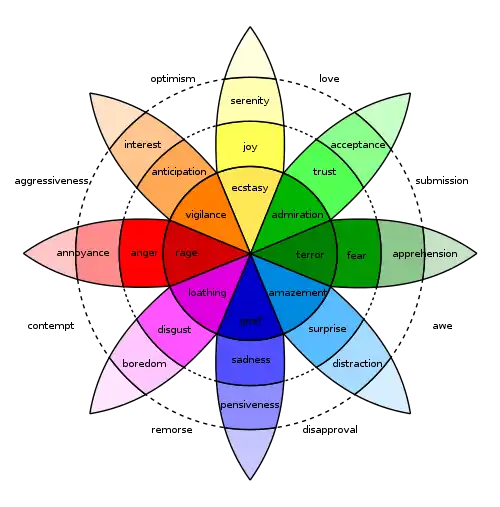Joy
The word joy means a feeling of great pleasure and happiness.[1]

Distinction vs similar states
C. S. Lewis saw a clear distinction between joy, pleasure, and happiness: "I sometimes wonder whether all pleasures are not substitutes for Joy",[2] and "I call it Joy, which is here a technical term and must be sharply distinguished both from Happiness and Pleasure. Joy (in my sense) has indeed one characteristic, and one only, in common with them; the fact that anyone who has experienced it will want it again... I doubt whether anyone who has tasted it would ever, if both were in his power, exchange it for all the pleasures in the world. But then Joy is never in our power and Pleasure often is."[3]
Causes
The causes of joy have been ascribed to various sources.
"When the mind is pure, joy follows like a shadow that never leaves.” - Gautama Buddha,[4]
"[Joy is] the emotional dimension of the good life, of a life that is both going well and is being lived well." - Miroslav Volf[5]
"This is the true joy in life, the being used for a purpose recognized by yourself as a mighty one; the being thoroughly worn out before you are thrown on the scrap heap; the being a force of Nature instead of a feverish selfish little clod of ailments and grievances complaining that the world will not devote itself to making you happy." - George Bernard Shaw[6]
Arianna Huffington has also been a big advocate of joy triggers, evoking joy through certain triggers.[7] These are triggers which related to activities that stimulate certain neurochemicals such as dopamine.[8] According to Huffington, activities that are able to evoke a positive neurochemical response are producers of joy and are a great source of goodness.
Ingrid Fetell Lee has studied the sources of joy. She wrote the book "Joyful: The Surprising Power of Ordinary Things to Create Extraordinary Happiness",[9] and gave a TED talk on the subject, titled "Where joy hides and how to find it."[10] Through her design studies she has found out that joy hides in colorful objects, an abundant number of objects, round objects, and elevating objects.
References
- "Joy - Definition of joy in English by Oxford Dictionaries". Oxford Dictionaries - English. Retrieved 21 November 2017.
- Surprised by Joy: The Shape of My Early Life. (p. 169) Houghton Mifflin Harcourt. Kindle Edition.
- Surprised by Joy: The Shape of My Early Life. (p. 18) Houghton Mifflin Harcourt. Kindle Edition.
- "A quote by Gautama Buddha". Goodreads.com. Retrieved 21 November 2017.
- Volf, Miroslav (Spring 2016). Joy and Human Flourishing. Fortress Press. p. 133. ISBN 978-1-4514-8207-2.
- "Man and Superman - Wikiquote". En.wikiquote.org. Retrieved 21 November 2017.
- Huffington, Ariana. "Joy Triggers".
- Jiang, Daniel. "Getting High Naturally - Happiness on Demand". Happyness By Design. Retrieved 7 September 2020.
- Lee, Ingrid Fetell. Joyful: The Surprising Power of Ordinary Things to Create Extraordinary Happiness.
- Lee, Ingrid Fetell, Where joy hides and how to find it, retrieved 2020-10-02

